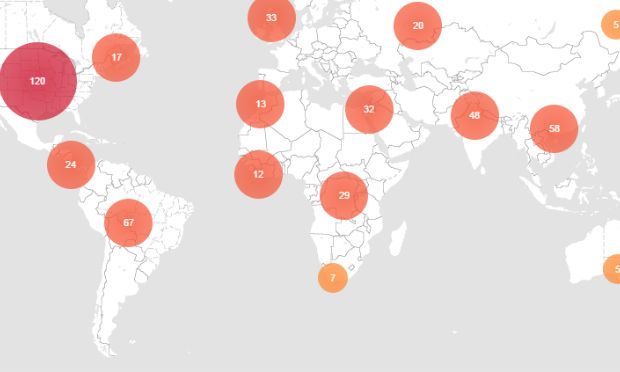News
See the following -
USHAHIDI: An Important Tool To Keep Track Incidences Of GBV
Four training sessions were organized on the use of Ushahidi and Gender Based Violence (GBV) data collection, on December 18th and 26th, 27th and 28th. They were attended by 108 commune/sangkat councilors and members of commune/sangkat committees in charge of women and children in Phnom Penh, Battambang, Siem Reap and Kampong Thom province. Read More »
- Login to post comments
Ushahidi: An Introduction To Anti-Corruption Mapping
This blog post is the first of a blog series on anti-corruption and transparency mapping by Ushahidi’s Heather Leson. The series will discuss best practices and feature some of the strategies to connect policy and action with online savvy. Read More »
- Login to post comments
Ushahidi: Machine Learning For Human Rights
“2-car acc @ State & Lake, both drivers injred” That short, hastily typed text message or tweet contains a lot of information that police, emergency responders, news organizations and drivers could use. Read More »
- Login to post comments
Ushahidi: The African Software Platform Helping Victims In Global Emergencies
During a natural disaster or in the midst of civil violence, the immediate need for those caught up in the situation is to escape and find a safe haven. But oftentimes in such chaos, information is difficult to come by and unreliable. Read More »
- Login to post comments
Using 3D Printers to Tackle Gaza's Medical Shortages
The stethoscope, a staple device in modern medicine, is a luxury item in Gaza. At Gaza's largest hospital, al-Shifa, there are only one or two stethoscopes in each department; doctors left without one resort to pressing their ears against patients' chests to diagnose an illness. "That would be the best-case scenario," Canadian doctor Tarek Loubani told Al Jazeera. "If someone's full of blood, most doctors aren't going to put their ears to the chest. So, doctors are making decisions without that piece of information"...
- Login to post comments
Using a Fitness App Taught Me the Scary Truth about Privacy Settings
After I’d completed my usual 5-kilometre near my London flat, a stranger I didn’t know “liked” my workout—even though I had enabled stricter privacy settings, which I thought would shield my workouts from public view. This happened several more times while I jogged the same route, and then again when I was on vacation in Barcelona. Alarmed at the idea of that strangers could see the routes I run on two or three times a week, I embarked on an investigation into the privacy settings of Strava...
- Login to post comments
Using Crowdfunding To Start A Company With A Cause
Two sisters, Kara Gorski and Kristin Gembala, have developed a bra designed to help breast cancer survivors who have had mastectomies and reconstructive surgery. So far, the sisters, who invested $25,000 from their savings, have designed and patented two styles and built a Web site. Currently, they are trying to raise money to begin manufacturing through a new crowdfunding platform. Read More »
- Login to post comments
Using Crowdsourcing to Track the Next Viral Disease Outbreak
 Last year's Ebola outbreak in West Africa killed more than 11,000 people. The pandemic may be diminished, but public health officials think that another major outbreak of infectious disease is fast-approaching, and they’re busy preparing for it. Boston public radio station WGBH recently partnered with The GroundTruth Project and NOVA Next on a series called “Next Outbreak.” As part of the series, they reported on an innovative global online monitoring system called HealthMap, which uses the power of the internet and crowdsourcing to detect and track emerging infectious diseases, and also more common ailments like the flu.
Last year's Ebola outbreak in West Africa killed more than 11,000 people. The pandemic may be diminished, but public health officials think that another major outbreak of infectious disease is fast-approaching, and they’re busy preparing for it. Boston public radio station WGBH recently partnered with The GroundTruth Project and NOVA Next on a series called “Next Outbreak.” As part of the series, they reported on an innovative global online monitoring system called HealthMap, which uses the power of the internet and crowdsourcing to detect and track emerging infectious diseases, and also more common ailments like the flu.
- Login to post comments
Using Data to Bridge Gaps in the Humanitarian Sector
 In humanitarian crisis response, we often don’t focus enough of our efforts on assessing needs and asking questions. In the wake of disaster, we instead get tunnel vision focused on delivering services as quickly and to as many people as possible. To help break that pattern, the relief industry has recently become fascinated with data. But we need to ask ourselves what data is truly helpful, actually useful, really helps us improve our impact, and better aids our beneficiaries. We often get excited about uncovering gems in big data archives. But the reality is that the most important and useful data is the real time feedback from those we serve...
In humanitarian crisis response, we often don’t focus enough of our efforts on assessing needs and asking questions. In the wake of disaster, we instead get tunnel vision focused on delivering services as quickly and to as many people as possible. To help break that pattern, the relief industry has recently become fascinated with data. But we need to ask ourselves what data is truly helpful, actually useful, really helps us improve our impact, and better aids our beneficiaries. We often get excited about uncovering gems in big data archives. But the reality is that the most important and useful data is the real time feedback from those we serve...
- Login to post comments
Using EHR, HIE To Share Vaccine Data Improves Public Health
EHRs are an effective tool in the fight against infectious diseases, according to a new study by researchers at the Columbia University School of Nursing. Automated immunization reporting using EHR data helped speed the collection of vaccine data and allowed public health agencies to assemble a clearer picture of at-risk populations. Read More »
- Login to post comments
Using GitHub As A Repository For Machine-Readable Scholarly Articles
Inspired by eLife, Pensoft now deposits article XMLs on GitHub Read More »
- Login to post comments
Using Innovation And Technology To Stimulate Your Local Economy
A pre-G8 day of dialogue is inviting social entrepreneurs to share ideas on addressing global challenges Read More »
- Login to post comments
Using Motorcycles To Survey In Haiti
As part of the CAP103 project, financed by USAID, being run in the North of Haiti right now we have started coordinating motorcycles for survey purposes. Read More »
- Login to post comments
Using open innovation and cognitive computing to solve healthcare's vexing problems
Open innovation can help healthcare organizations learn from each other to benefit a broader innovation network, while cognitive systems can learn from training by experts, from every interaction, and from continually ingesting new sets of data. In fact, they never stop learning. The IBM report highlights how agencies are employing open innovation across healthcare technology systems. Applying cognitive computing would further promote that innovation.
- Login to post comments
Using Open Source PDF Technology to Solve the Unstructured Data Problem in Healthcare
 If there’s one major challenge to single out in healthcare IT today, it would be leveraging the growth and usage of big data. While consumer IT made big advances in the past decade to get a handle of data by marking up content, indexing it, and annotating it for use, enterprise, and healthcare IT in particular, still need to catch up on making data actionable...This article provides insights into how using the Portable Document Format (PDF) and accompanying tools within healthcare organizations can be a powerful way to help solve the unstructured data challenge, speed up processes, and reduce the costs for document handling.
If there’s one major challenge to single out in healthcare IT today, it would be leveraging the growth and usage of big data. While consumer IT made big advances in the past decade to get a handle of data by marking up content, indexing it, and annotating it for use, enterprise, and healthcare IT in particular, still need to catch up on making data actionable...This article provides insights into how using the Portable Document Format (PDF) and accompanying tools within healthcare organizations can be a powerful way to help solve the unstructured data challenge, speed up processes, and reduce the costs for document handling.
- Login to post comments